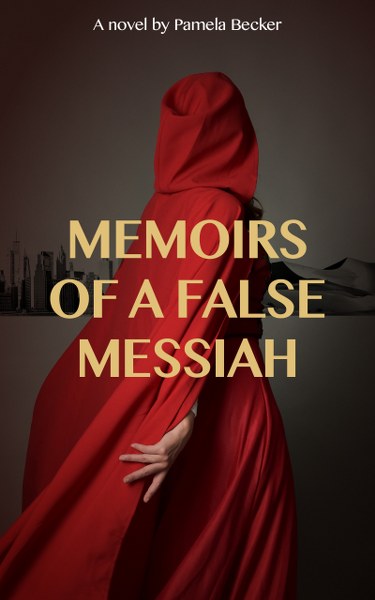Memoirs of a False Messiah by Pamela Becker Book Tour and Giveaway :)
Memoirs
of a False Messiah
by
Pamela Becker
Genre:
Women's Fiction
MiMi
knows she is meant for something greater. She has a God-given
mission. This belief, together with tragedy, moves her from the
mixed-religion home of her early childhood to Orthodox Judaism in her
teens, to the establishment and development of her cult in the
Israeli desert. MiMi draws from the women in her life, in the Bible,
and in other ancient texts, weaving modern and biblical dilemmas, as
she shapes a truly unique place for her followers and herself. When
her life and utopian community grow more turbulent and even violent,
she questions her mission.
Deeply
affecting and thought-provoking, Memoirs of a False Messiah is the
richly told story of a woman's struggle to find her place in a world
reluctant to accept her.
Goodreads
* Amazon
Kindle Countdown Sale!
Sep 3 & 4 - only . 99 cents!
Sep 5 & 6 - only $1.99!
Sep 7 & 8 - reduced to $2.99
I
had my first vision at three.
One
night, as I slept, I saw myself as a grown woman, surrounded by lions
standing on hind legs growling at me, a wall of fire glowering behind
me. The only way out was a rope that descended from above but was
attached to nothing. I climbed it; my thighs rubbed raw from its
roughness, my feet bloody where the lions nicked them with their
teeth, my robes flaming, making me unbearably hot until I dropped the
garments below and continued climbing higher. “MiMi,
it’s okay,” my father’s voice broke through the dream, and I
opened my eyes. He sat on the edge of my bed and patted the damp
bangs away from my forehead. His thick black hair was messy, and he
wore only an undershirt and boxer shorts. His eyes, blue with specks
of gold, momentarily disappeared in the shadows of his
face and I could feel him shivering in my small room. To
my father - I told him what happened, watching his eyebrows join with
concern - this was a bad dream brought on by an overactive
imagination and normal childhood fears. But to me, the dream
signified much more. The next day, after I found scratch marks on the
bottoms of my feet, I asked my father to write down the details of my
dream as I explained them to him. I put that piece of paper in a
special paper-mâché jewelry box I was given on my birthday. I
had recently learned to read from a record of songs
based on Bible stories. I can’t imagine who might have given me
such an album. My father was a fallen Orthodox Jew, disowned by his
family when he married my non-Jewish mother. I’m surprised that not
only was the record ever brought into my parents’ home but that it
remained. With
a babysitter's help, I mastered the kiddie record player. I played
the Bible song record, and sitting on my knees in my bedroom,
followed the lyrics printed in large letters on the back of the album
cover. The
first song was about Daniel and the Lions’ Den. I don’t recall
how the words go anymore but the drawing on the album cover of a
small boy standing alone, surrounded by angry, vicious lions,
frightened me. I would close my eyes as I listened to the song and
imagined myself in the den. After
the night I had my vision, my parents paid more careful attention to
my education. The Bible record disappeared and was replaced with one
of fairy tales, of helpless beautiful girls saved at the last minute
by their handsome princes. I commented that the princesses’ parents
didn’t take good care of them, and soon that record disappeared
too. My father took to setting me on his lap, and we read the
newspaper together. In the family room, the television off and all my
toys put away for the evening, I would sound out the headlines, and
he would read me the articles. That’s
one of the happiest memories of my childhood, reading the paper with
my father, stumbling over words like "inflation," sitting
on his lap, my bright orange cotton-covered legs over his heavy blue
jeans. I remember staring at his toenails, which were always a little
too long and thick and thinking how powerful my father was. And how
safe I was sitting on his lap. That’s one of the nasty tricks of
childhood: the illusion of security. I
don’t have those kinds of memories about my mother. She worried
about my eating the right foods and growing at the correct rate. Born
small and underweight, like a raisin under a gray blanket in my black
and white baby photos, I looked sunken until I hit puberty, no matter
what she fed me or in what quantity. My mother, though, never looked
sunken, even in her worst moods. Her skin always looked tan, her
features sharp and her gray eyes clear. Her thin frame managed enough
curves to keep her from appearing too skinny. She
decorated my bedroom with yellow wood furniture and carpeting that
turned brown by the doorway. The wallpaper was striped yellow and
green. No flowers. No pink. A gender-neutral haven for me in my
formative years. Her own room was decorated with hefty wood, dark
wool afghans, and a shaggy brown rug. Nothing too feminine. That's
how she dressed, too. Her clothes in muted colors looked serious. Her
high, defined cheekbones and sturdy chin seemed to cooperate in
denying any femininity. She had no time for makeup or time-consuming
hairstyles, but I could tell by the way strangers looked at her that
she was an attractive woman. My
mother had movement. People stared at the way she walked or lifted an
object or how the wind blew her blond hair across her face. When she
carried her coffee mug to
her thin lips, you couldn’t help but watch the mug’s path, the
curl of her fingers around the handle, the purse of her lips as she
blew inside to cool the hot brown stuff. She was beautiful when she
was in motion. But
when she was still, her hair settled on her neck, her gray eyes
darkened, and her hands looked bony and long. She described herself
as very Shiksa-looking,
which I thought was my religion until years later I asked the
librarian for a book on Shiksa-ism
and
she set me straight. My
dad, on the other hand, was all dark - hair, eyebrows
and the stubble on his face that emerged by lunchtime. In a picture
of a trip to the beach that sat in a wooden frame on the bookshelf,
the black curls on his legs, arms, and even hands contrasted sharply
against the light down on my mother and me. I
had a friend Tracey who lived across the street. My mother and I
would go over there together. While the grown-ups drank coffee and
ate cake, Tracey and I played with girlie toys that I usually had no
access to at home: Barbies with all the accessories; dolls that wet
their pants or regrew their hair after haircuts; and jewelry making
kits that produced clunky pink bracelets and rings. I knew I was
supposed to look down on such gender-specific toys, which made
playing with them that much more fun. Besides, Tracey did anything I
told her to. I controlled our games. Tracey’s
mom, Chrissy, would get down on her knees and show us how to mix and
match Barbie’s clothes, and then she’d grab Tracey and rub her
tummy until she laughed. When she tickled me too, I would giggle
while my mom remained in her chair, her hot coffee still in her hand,
looking down at us smiling. Then she would ask Tracey to show me her
books. By
the time I started nursery school, I could read the Golden Book
series to the other kids. I remember having confidence way back then
of my power over my peers. They sat around me in a semi-circle and
listened quietly as I read, their eyes on me, not the pictures.
The teachers told my parents that I showed promise and moved me to
pre-kindergarten. My
father taught me numbers, and soon I was adding. My mother would put
me in the cart when she went grocery shopping, and by the time I was
five, I would add the prices for her. Of course, I made mistakes, and
remember crying because the decimal point that came between the
dollar and the cents sides baffled me. When
I went to kindergarten, my mother went back to work full-time. She
started to complain to my father that he had to help around the house
more. They spent Sundays doing laundry, cleaning the house and having
grown-up time, while I
played at Tracey’s. At her Catholic school, she could only wear
blue, gray or white clothes, and so we played dress up in the most
outlandish outfits. Chrissy would find us, trapped on the high
bathtub rim from where we had tried to see ourselves in the mirror.
She would peel off the layers of the odd clothes, leaving us in
Tracey’s ballet uniforms that we wore during these games, and sit
us down at the kitchen table with milk, cookies, paper and a box of
144 crayons that astounded me by its opportunities. Tracey
drew pictures of us in our outfits, the heads, hands, and feet always
too big. I sketched tall women with blond hair falling from the sky
into the mouths of flames. With over twenty shades of orange and red
to work with, I tried to perfect the fire each time. My mother
refused to tape the pictures on the refrigerator, so I kept
them in a pile in my desk drawer. Sometimes,
I stood in the kitchen doorway watching my mother and my dad make
dinner. My mother would cry as my father held her against his chest
for what seemed like a long time, or until something on the stove
started smoking. They were about
the same height, about 5’9”, and she stooped a little when he
cradled her head in his neck, her arms around his shoulders, his
hands gripping each other at the small of her back. I could see my
father’s face through strands of my mom’s blond hair, the shadow
of a beard showing, his teeth biting his lower lip and his eyes
focused on me. I hated that look of helplessness on my father’s
face and my mother’s weakness for causing it. No
one knew for sure what made her so sad as if it was some outside,
uncontrollable, indiscernible force. The years passed, and as I grew
bigger, my mother cried more and more frequently. She started missing
dinner once and then twice a week for mysterious appointments. She
would come home after I was already in my room for the night, and I
heard the pouring of coffee and my parents’ low voices in the
kitchen until I fell asleep. On those nights my father and I ate
simple dinners of spaghetti and salad. He’d ask me questions about
school and draw diagrams and word problems to show why subtraction
was important, and what ancient history has to do with today. I loved
those evenings so much; I secretly hoped my mother would have
her appointments every night.
Memoirs
of a False Messiah is Pamela Becker's debut novel. Originally from
New York, she has enjoyed a long career as a marketing executive and
consultant for some of Israel's leading technology companies. After
she was widowed with three small children, Pamela co-founded and
remains the active chairperson of the Israeli charity Jeremy's
Circle, which supports children coping with cancer treatment or
cancer loss in their immediate families. A graduate of the Writing
Seminars program at the Johns Hopkins University and the Arad Arts
Project artist residency program in Israel, she earned an MBA from
Tel Aviv University. Pamela lives with her husband and their five
children in Tel Aviv.
Follow
the tour HERE
for exclusive excerpts, guest posts and a giveaway!








Comments
Post a Comment